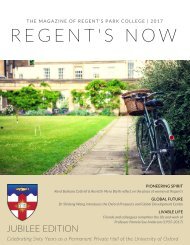Regent's Now Magazine 2019 WEB
Create successful ePaper yourself
Turn your PDF publications into a flip-book with our unique Google optimized e-Paper software.
REGENT’S NOW FEATURES
historic moment Central Appalachia is experiencing
now. In the mountains, the fog never really lifts and
clings low to the earth, wisping along the surface
of the water like smoke. The sun rises later and sets
sooner, dipping behind the sloping peaks and making
one slightly more grateful for the daylight hours.
In one of my field sites, one of the oldest gorges in
the United States sits at the Russell Fork, a small
tributary barely worth mentioning but attracting
adventure tourists from all over the world every
year at the annual release of the waters in the fall,
making for Olympic-level rapids for those seeking to
chase. The town nearest the fork, Elkhorn City, is a
true blink-and-you’ll-miss-it kind of town, of fewer
than a thousand inhabitants, a single main road that
runs the length of it and few stores outside the local
hardware store and grocery. But Elkhorn City, for a lot
of folk around the area, is a symbol as much as a place.
The town was once a booming coal town, settled
right on the state line. The mines and the railroads
still run, if infrequently, but the town’s bustle is gone,
except for during the release of the rapids. However,
local politics have proven fraught and friction between
the townspeople and local government has prevented
much of the development the community members
desire; namely, development that celebrates the river
and the rapids, instead of exploitative businesses that
come and go.
For Appalachia, the land is as much part of the
heart and soul of the region as it is the history and
geography. Place in the thick sense of the word –
including the rituals, the culture, the memory and the
feel of a location, not simply the point on the map – is
entwined so thoroughly into the Appalachian story
that it cannot be unwound. Why would one want to?
These paltry words and few photos cannot truly do
justice to Appalachian Kentucky and the surrounding
area, but I hope to leave you with this food for
thought. Despite what one may hear in the news or
in the pop culture either about Appalachia (Hillbilly
Elegy, anyone? Do yourself a favor and pick up What
You’re Getting Wrong About Appalachia by Elizabeth
Catte instead), Appalachia is a proud region full of
faults, but so much more. In the hills, there is the pain
of a history fraught with conflict and war, rebellion
and uprising, exploitation and extraction – but there
is also hope, strength, and resilience. The concept
that Appalachia is ‘dying’ is a false one, as my own
history and research so fully describe. Appalachia is
very much alive, if wounded. Much like the mountains
themselves, Appalachia and her people aren’t going
anywhere – we are just getting started.
Meredith Scalos was a Visiting Student (2014) at the
College and returned to read for the MPhil in Development
Studies (2017).
19





